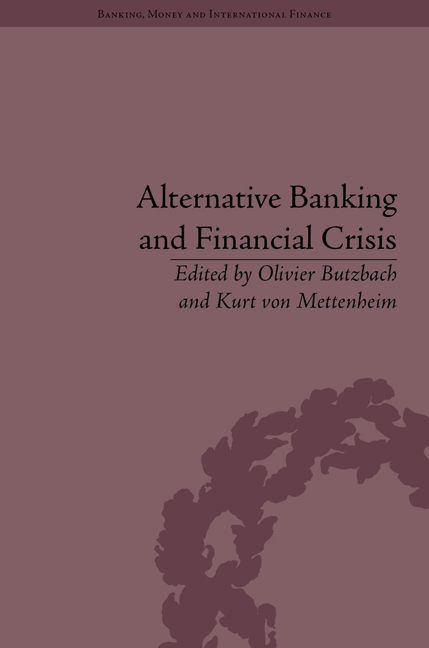Book contents
- Frontmatter
- CONTENTS
- Acknowledgements
- List of Contributors
- List of Figures and Tables
- Introduction
- Part I Historical Context and Conceptual Framework
- 1 Alternative Banking History
- 2 The Comparative Performance of Alternative Banks before the 2007–8 Crisis
- 3 The Counter-Cyclical Behaviour of Public and Private Banks: An Overview of the Literature
- 4 Explaining the Competitive Advantage of Alternative Banks: Towards an Alternative Banking Theory?
- Part II Comparative Country Cases
- Conclusion
- Notes
- Index
2 - The Comparative Performance of Alternative Banks before the 2007–8 Crisis
from Part I - Historical Context and Conceptual Framework
- Frontmatter
- CONTENTS
- Acknowledgements
- List of Contributors
- List of Figures and Tables
- Introduction
- Part I Historical Context and Conceptual Framework
- 1 Alternative Banking History
- 2 The Comparative Performance of Alternative Banks before the 2007–8 Crisis
- 3 The Counter-Cyclical Behaviour of Public and Private Banks: An Overview of the Literature
- 4 Explaining the Competitive Advantage of Alternative Banks: Towards an Alternative Banking Theory?
- Part II Comparative Country Cases
- Conclusion
- Notes
- Index
Summary
Introduction
As seen in Chapter 1, the long and rich history of ‘alternative banks’ has not ended in the 1980s but has taken a different turn. Since the liberalization of banking across Europe, domestic regulators and alternative bank managers have pursued a wide variety of policies and strategies. Some public savings banks, notably in France, opted for conversion into cooperatives. In Sweden, Belgium, Italy and Spain, savings banks were privatized. However, in Italy shares were granted to savings bank foundations designed to reaffirm and separate the traditional social role of savings banks from banking operations. And Spanish Cajas de Ahorro retain significant social mandates and regional and local corporate governance while competing with each other and private banks across regions. In Portugal, Ireland and Greece, alternative banks were modernized only to confront severe downturns since the 2008 crisis. German savings and cooperative banks retained their legal forms (mostly independent local or regional public companies) to consolidate and deepen wholesale networks and associations. In the Netherlands the Rabobank cooperative bank group declined during the 1990s, only to recover large market shares and globalize after 2000. This wide variety of policies, reforms and alternative bank strategies amidst the convergence of bank regulations under the European Community, single currency and revolution in information and communication technologies provides an exceptional quasi-experimental opportunity for further research and comparison.
- Type
- Chapter
- Information
- Alternative Banking and Financial Crisis , pp. 29 - 42Publisher: Pickering & ChattoFirst published in: 2014



